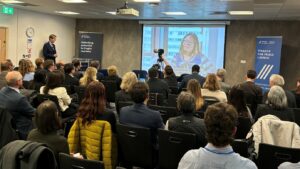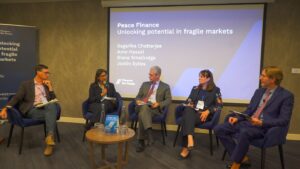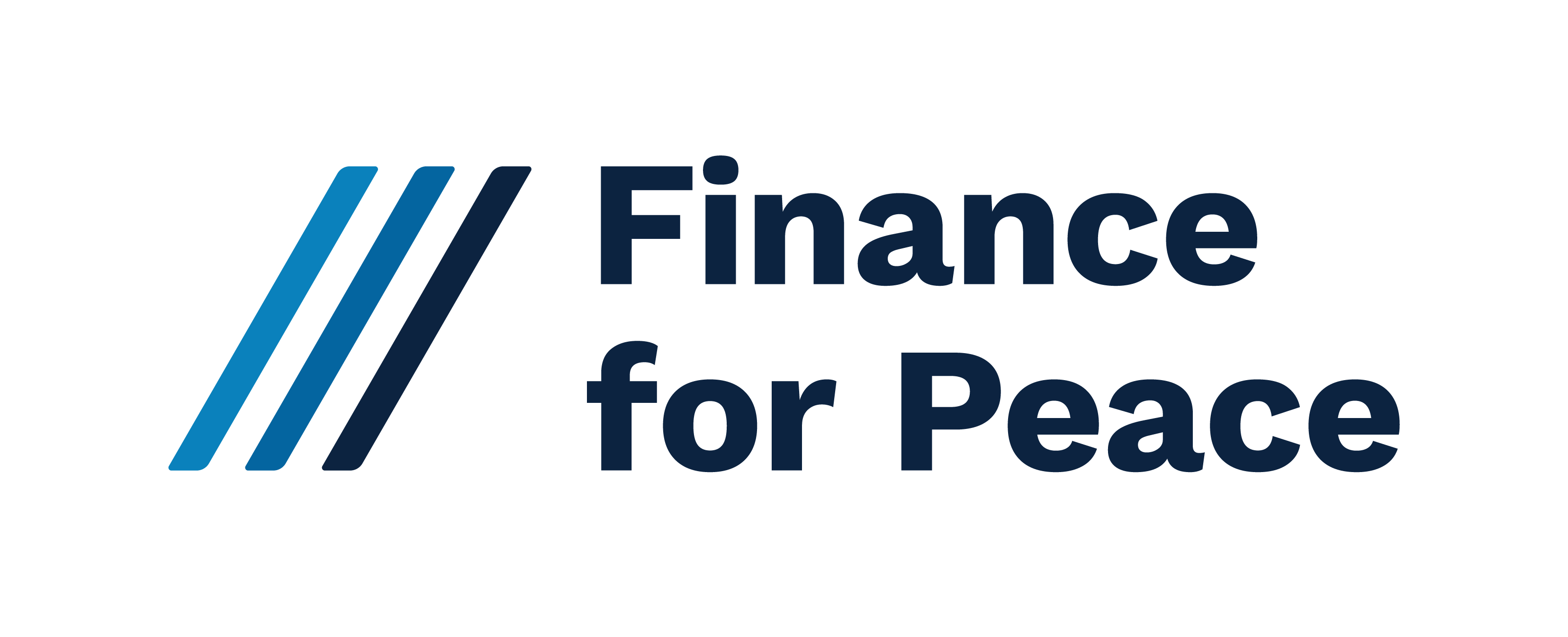Finance for Peace launched in London
Finance for Peace was launched on 27 November as an independent, standard-setting organisation to be based in London, the United Kingdom. The launch event in the City of London, the UK’s financial centre, saw a full house of impact investing and finance experts, together with peacebuilding and development counterparts, come together to witness the start of this new chapter for Peace Finance. With its independent set up and new brand identity, Finance for Peace will now take root as a pioneering institution in London, at the heart of one of the world’s financial capitals.

This new organisation, with tools such as the Peace Finance Impact Framework and Peace Bonds, represents a bridge – a bridge that connects the principles of peacebuilding with the rigor and reach of modern finance. It is estimated that Peace Finance could grow into a USD 25-30 billion market, unlocking transformative investment in fragile regions around the world.
Participants discussed the challenges and opportunities of integrating peace standards into finance, emphasising the importance of capacity-building, education and clear frameworks. They noted that intermediaries often fail to understand peace standards, leading to ineffective implementation. There was a consensus on the need for robust mechanisms to measure peace impact, transparent reporting and certifications in order to monitor ongoing alignment.
Itonde Kakoma, President of Interpeace
“Through years of dialogue and research, we identified a critical gap: the lack of a systemic approach to align the private sector and investment with peacebuilding outcomes. Finance for Peace was incubated to address this need.
“Peace is more than the absence of conflict – it is the presence of trust, social cohesion and shared opportunity. Our work has always been about fostering trust – whether at the grassroots level, among divided communities, or in high-level negotiations. Finance for Peace takes that ethos into a new domain, because, similarly, trust is the currency of effective investment. Without it, both markets and societies falter.
“Finance for Peace bridges these worlds, demonstrating how investment can be a driver of trust, resilience and peace. By setting standards and frameworks, it creates the transparency and accountability necessary to attract investment into places that need it most while protecting and empowering local communities.
“The success of Finance for Peace depends on all of us.”
Fiona Reynolds, Chair, Finance for Peace Steering Committee
“Peace Finance is investment that intentionally improves conditions for peace and realises peace impact while driving inclusive development that reduces social risks for both investors and communities.
“We are not short of money but it is not flowing where it is needed most. This deepens inequality and conflict.”
“There is no denying that without the private sector, governments will not resolve the current challenges by themselves. But these challenges cannot be resolved if we only invest into the developed world”.
Dr Felix Karstens, First Secretary, German Embassy London
“Finance for Peace has been one of the flagship projects of the German Federal Foreign Office. The groundwork has already been laid, and it is now crucial to shift focus onto the implementation phase, ensuring that peace-positive investments are widely adopted, due to their necessity, but also embraced for the significant opportunities their represent. Having supported the Finance for Peace initiative since its inception we are glad to see it come to its own.
“We hope today’s event marks not just the launch of an independent standard-setting organisation but also a significant step forward in advancing peace.”
“There is a tremendous potential in Peace Finance” (panel)
Justin Sykes, Founder and Managing Director of Innovest Advisory, shared insights on linking initiatives as an example of how such approaches can foster stability: Intentionally linking the demobilisation of militias with cooperatives and investments, like in the PeaceGold initiative, shows the power of connecting peacebuilding and economic opportunity.
Fiona Reynolds stressed the importance of breaking down silos within the investment community, arguing that addressing issues like climate change requires simultaneous consideration of developing and conflict-affected areas.
Arne Hassel, Chair of the Peace Finance Standards Committee, highlighted the importance of learning from established principles while ensuring that peacebuilding standards address specific challenges in this area: There’s a lot to learn from principles people have been working on, but our standards specifically address peacebuilding, aligning good business with good impact.
Diana Smallridge, CEO of Momentus Global, highlighted the importance of the national development banks in the Peace Finance equation: “In these fragile areas, national development banks bring the traditional ways of finance. They are the unsung heroes of development who have been below the radar of the green finance space. These banks are close to the risks, much closer than any other financial institutions. SDG 16 is about peace, but also about strong institutions giving national institutions the ability to create peace.
Having just returned from COP29, Sagarika Chatterjee, Director, Climate Finance, Climate Champions, focused on climate finance’s links to Peace Finance: “My big personal learning is that climate and sustainable development go hand in hand. Peacebuilding will unlock climate financing and vice versa. Developing countries lack finance, not capacity. Data is fundamental, reporting will be key in Peace Finance, also definitions and taxonomy. The Peace Finance Impact Framework can help avoid some of the mistakes previously made in climate finance. And I’d also say that Peace Finance should be ready for some backlash in the future, and it’s important to have a whole-of-society approach to mitigate that from the outset.”

From left to right: Justin Sykes, Sagarika Chatterjee, Arne Hassel, Diana Smallridge, Mark Barton
Fiona Reynolds: “Why don’t we invest in emerging markets? Because of risks. But investing in a way that leads to more peaceful outcomes changes the equation.”
Justin Sykes: “The key to success is bringing theory to practice and to facilitate supply and demand of capital.”
Arne Hassel: “Finance is a tool – we can use it for good and bad purposes. Anything that is powerful needs standards and rules.”
What next for Finance for Peace?
Watch the full discussion here:
Fiona Reynolds: “The Finance for Peace entity here in London will principally serve as a standard-setting body. It will bring together investors, governments, development institutions, peacebuilders and civil society, and support them to implement peace-aligned investments. By establishing robust frameworks, such as the Peace Finance Impact Framework and the Peace Finance Standard for Peace Bonds and Peace Equity, we provide tools that de-risk align capital and align it with peace outcomes.
“This initiative builds on a strong legacy of feasibility research and real-world application, making peace-positive investment not only aspirational but achievable.”

